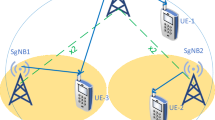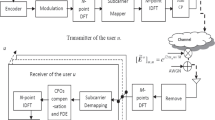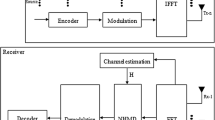Abstract
OVSF codes are used as channelization codes in WCDMA. Due to code blocking property of OVSF codes, the bandwidth available in the system is severely limited. Code reassignments mitigate the impact of the blocking property at the expense of causing delays and decreasing the throughput of the system. Nonblocking OVSF (NOVSF) codes have been proposed to alleviate the adverse effect of code reassignments. This paper presents a code assignment algorithm for NOVSF codes, which does not require any code reassignments. Simulation results show that NOVSF codes achieve better throughput than OVSF codes, even though code reassignments are allowed in the assignments of OVSF codes.
Similar content being viewed by others
References
F. Adachi, M. Sawahashi and K. Okawa, Tree-structured generation of orthogonal spreading codes with different lengths for forward link of DS-CDMA mobile radio, IEE Electronics Letters 33(1) (1997) 27-28.
F. Adachi, M. Sawahashi and H. Suda, Wideband DS-CDMA for next generation mobile communications systems, IEEE Communications Magazine 36(9) (1998) 56-69.
R. Assarut, U. Yamamoto and Y. Onozato, Region division assignment of orthogonal variablespreading-factor codes in W-CDMA, in: IEEE Vehicular Technology Conf., Vol. 3, October 2001, pp. 1884-1888.
H. Çam, Nonblocking OVSF codes for 3G wireless and beyond systems, in: Proc. of the Internat. Conf. on 3rd Generation Wireless and Beyond'2002, June 2002, San Francisco, USA, 2002.
H. Çam, Nonblocking OVSF codes and enhancing network capacity for 3G wireless and beyond systems, Computer Communications, to appear.
H. Çam and N. Challa, Supporting rate and soft delay guarantees for data traffic in the downlink shared channel of WCDMA, in: Proc. of the Internat. Conf. on Wireless Networks (ICWN)'2002, Las Vegas, USA, June 2002.
H. Çam and K. Vadde, Performance analysis of nonblocking OVSF codes in WCDMA, in: Proc. of the Internat. Conf. on Wireless Networks (ICWN)'2002, Las Vegas, USA, June 2002.
R.G. Cheng and P. Lin, OVSF code channel assignment for IMT-2000, in: IEEE Vehicular Technology Conf., Vol. 3, May 2000, pp. 2188-2192.
R. Fanatacci and S. Nannicini, Multiple access protocol for integration of variable bit rate multimedia traffic in UMTS/IMT-2000 based on wideband CDMA, IEEE Journal on Selected Areas in Communications 18(8) (2000) 1441-1454.
P. Goria, C. Guerrini and A. Vaillant, Signaling delay of code allocation strategies, in: 1st Mobile and Wireless Telecommunication Summit, 2002.
A.C. Kam, T. Minn and K.Y. Siu, Supporting rate guarantee and fair access for bursty data traffic in W-CDMA, IEEE Journal on Selected Areas in Communications 19(11) (2001) 2121-2130.
S. Malik and D. Zeghlache, Improving throughput and fairness on the downlink shared channel in UMTS WCDMA networks, in: European Wireless'2002, Florence, Italy, February 2002.
T. Minn and K.Y. Siu, Dynamic assignment of orthogonal variable-spreading factor codes in WCDMA, IEEE Journal on Selected Areas in Communications 18(8) (2000) 1441-1454.
Physical channels and mapping of transport channels onto physical channels (FDD), Third Generation Partnership Project Technical Specification Group Radio Access Network, TS 25.211 V3.12.0 (September 2002).
Radio link control/medium access control (RLC/MAC), Third Generation Partnership Project Technical Specification Group Radio Access Network, TS 144.160 V5.0.0 (July 2002).
L. Tsaur and C. Lee, Symbol rate adaptation and blind rate detection using FOSSIL (forest for OVSF-sequence-set-inducing lineages), in: IEEE Internat. Conf. on Communications, Vol. 6, 2001, pp. 1754-1759.
Author information
Authors and Affiliations
Rights and permissions
About this article
Cite this article
Vadde, K., Çam, H. A Code Assignment Algorithm for Nonblocking OVSF Codes in WCDMA. Telecommunication Systems 25, 417–431 (2004). https://doi.org/10.1023/B:TELS.0000014792.81984.fe
Issue Date:
DOI: https://doi.org/10.1023/B:TELS.0000014792.81984.fe




